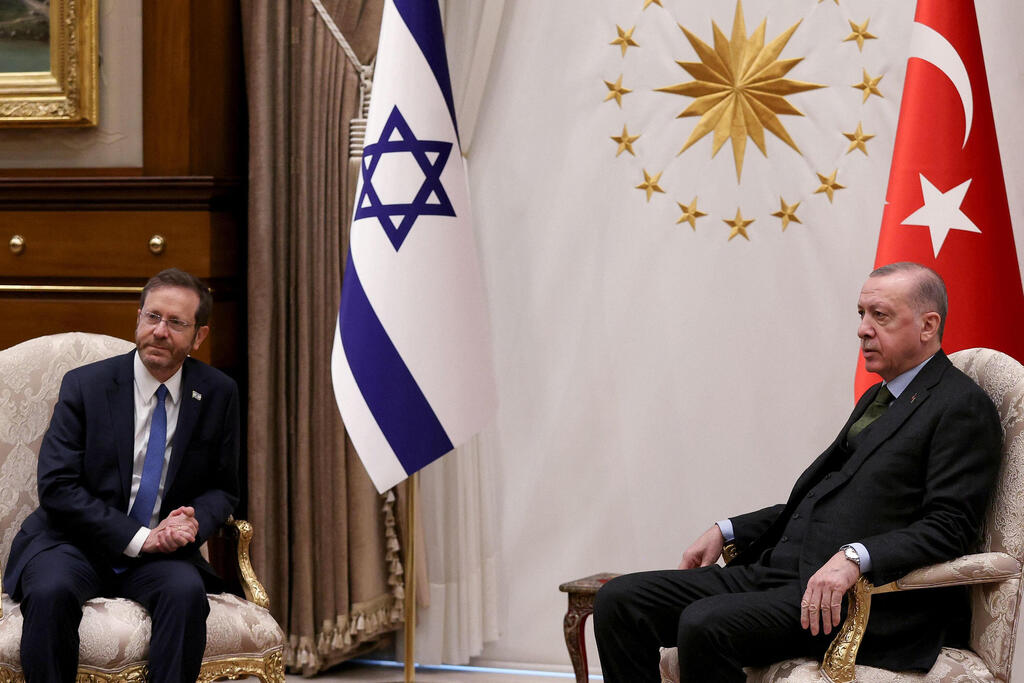Getting your Trinity Audio player ready...
Turkish President Recep Tayyip Erdogan said on Wednesday that his meeting with Israeli counterpart Isaac Herzog was a watershed moment in the relations between the two countries.
"I am very pleased to host the Honorable President Herzog here at our residence in Ankara. I believe that this historic visit will be a turning point in relations between Turkey and Israel," he said in a joint statement with President Herzog after a two-hour meeting between the two at the Presidential Palace in Ankara.
6 View gallery
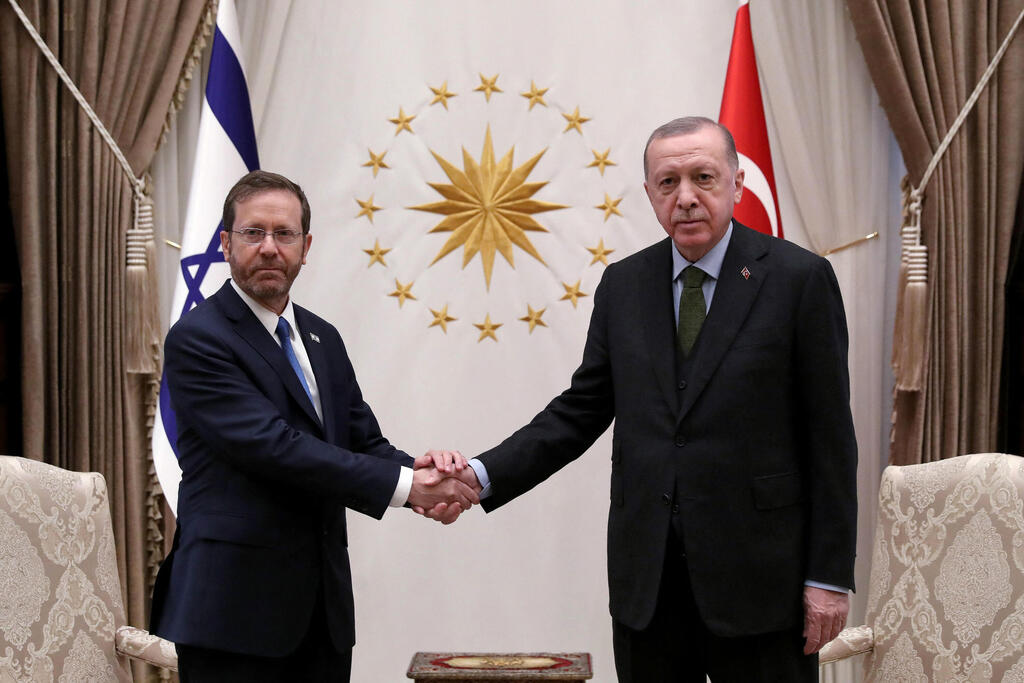

President Isaac Herzog and Turkish counterpart Recep Tayyip Erdogan meet at the Presidential Palace in Ankara
(Photo: AFP)
"Our shared goal is to stimulate and reinvigorate the political dialogue between the countries that is based on shared interests and mutual respect of the other's sensibilities.
"Strengthening and developing the relations between Turkey and Israel is of great value to our country, as for peace in the region."
Herzog was greeted with a rousing fanfare in the Turkish capital Ankara on Wednesday as he arrived there in a bid to mend fences after relations between the two countries soured in recent years. He became the first Israeli leader to do so in 14 years.
The Turkish president further stated that the Palestinian issue was one of the key issues discussed with Herzog.
6 View gallery
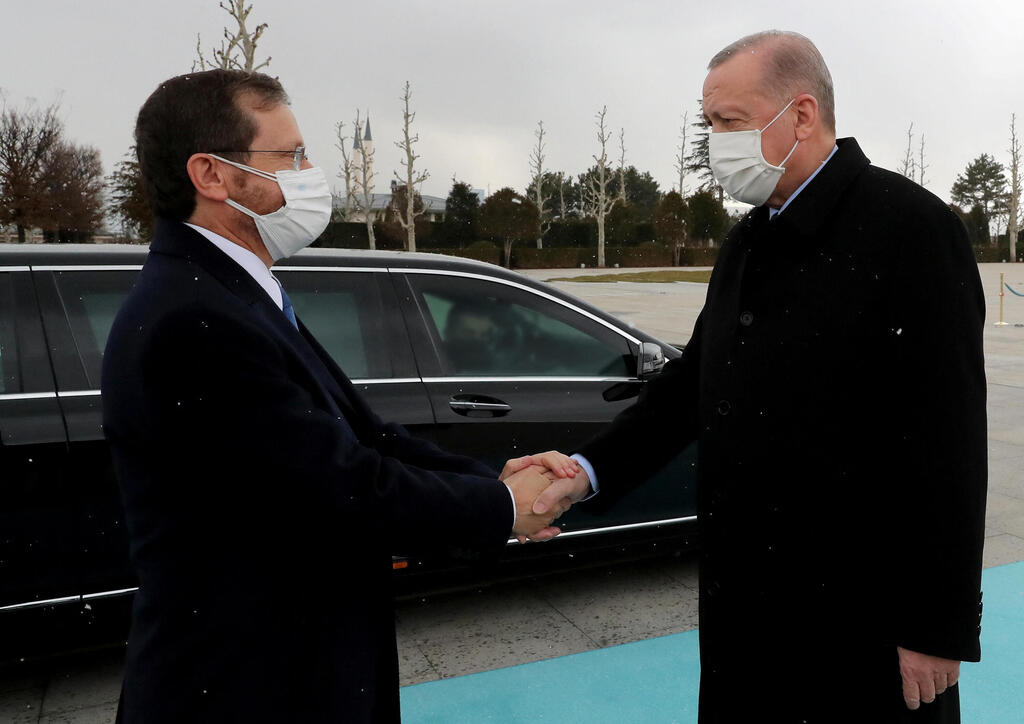

Herzog and greeted by Erdogan as he arrives at Presidential Palace in Ankara
(Photo: Reuters)
"I expressed the importance we attach to reducing tensions in the region and to pursuing a two-state solution. I drew attention to improving the living conditions of Palestinians," he said, adding that Turkey expects Israel to facilitate further humanitarian actions for the sake of the Palestinian people.
Erdogan also condemned antisemitism as a "crime against humanity" and said that "Turks and Jews are the best example of coexistence that has lasted for centuries. We will not allow this long and special history to be overshadowed."
Herzog said that "Israel and Turkey... can and should collaborate in many fields that have a dramatic impact on this region, which we all call home," and announced that Turkish Foreign Minister Mevlüt Çavuşoğlu will arrive in Israel next month.
"The baggage of the past never disappears of its own accord, but we — our two peoples, our two countries — are choosing to embark on a journey of trust and respect, which will include an in-depth dialogue in all fields, and I thank you for the in-depth discussion we just held. We are choosing to look forward, together. We must agree in advance that we will not agree on everything. Such is the nature of a relationship with a past as rich as ours," he said.
6 View gallery
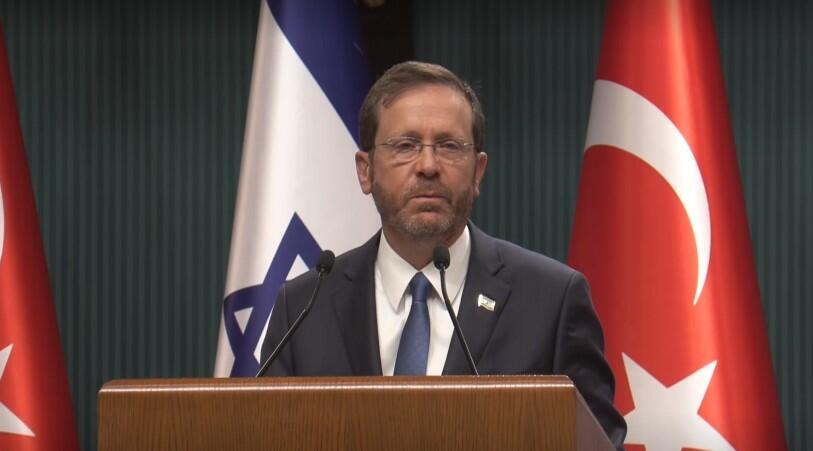

Herzog speaks at the Presidential Palace in Ankara in a joint statement with Erdogan
(Photo: Roee Idan)
Çavuşoğlu announced before Erdogan and Herzog's joint statement that he will be arriving in Israel on April third in the first visit of a Turkish diplomatic chief officer in the Jewish nation in 15 years. He stated that he will also be paying a visit to the Palestinian Authority.
Herzog also commended his Turkish counterpart for his efforts to mediate a solution that would bring an end to ongoing hostilities between Russia and Ukraine.
Herzog will later travel to Istanbul for meetings with the Jewish community there.
Earlier on Wednesday, Herzog was greeted by Erdogan and a military honor guard, while a band played the Israeli anthem in the Turkish capital for the first time since 2008.
6 View gallery
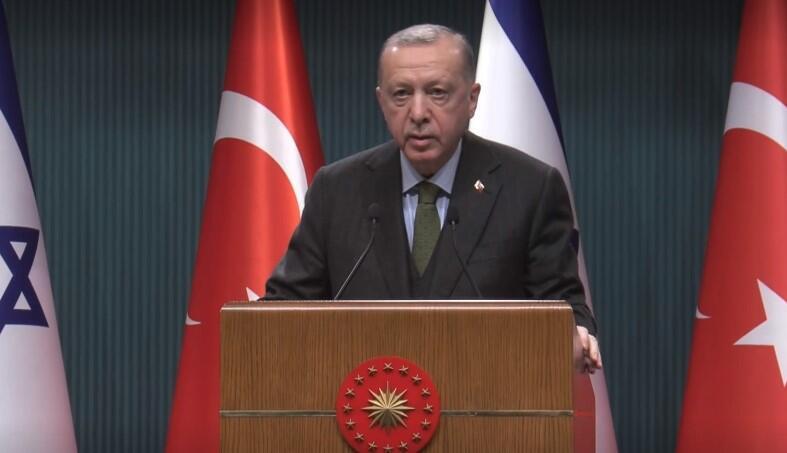

Erdogan speaks at the Presidential Palace in Ankara in a joint statement with Herzog
(Photo: Roee Idan)
"We will not agree on everything, and the relationship between Israel and Turkey has certainly known ups and downs and not-so-simple moments in recent years," Herzog told reporters at Tel Aviv's Ben Gurion airport. "But we shall try to restart our relations and build them in a measured and cautious manner, and with mutual respect between our states."
“I always emphasize that my vision is that Jews, Muslims, and Christians will live in peace in our region in a manner that will bring them prosperity and perfect lives.
“My visit is completely coordinated with Prime Minister Naftali Bennett and Foreign Minister Yair Lapid and their offices, and I hope that in the wake of my visit, a serious process will begin with Turkey, an in-depth dialogue at various levels, and that ultimately we will see, so I hope, progress in our relations and positive results. Thank you very much, everyone.”
In Istanbul, a group of about 150 people, mostly members of pro-Islamist groups, protested Herzog's visit, chanting anti-Israeli slogans and holding up banners calling the Israeli president a "killer." The protesters included members of the Turkish Islamic relief group IHH, which organized the Gaza-bound flotilla that broke the Israeli blockade in 2010.
6 View gallery


Israel's Tamar gas field in the Mediterranean Sea
(Photo: Albatross Aerial Photography)
One particular area of interest for Turkey and Israel is natural gas. Erdogan has said the visit will herald a "new era" and that the two countries could work together to carry Israeli natural gas to Europe, reviving an idea first discussed more than 20 years ago.
Gas supplies from the Mediterranean could ease European dependence on Russian gas, a hot topic following Russia's invasion of Ukraine and subsequent calls from European leaders to reduce the continent's reliance on Russian gas.
Plans for a subsea pipeline from the east Mediterranean to Europe, excluding Turkey, have stalled after the United States expressed misgivings in January.
A senior Turkish official said Russia's invasion of Ukraine had shown that concrete steps were needed to diversify energy sources in the market.
"It is critically important to transport gas resources in Israel to Turkey and from there to European markets," the official said. "It should be a critical and supportive step for Europe in terms of resource diversity. Turkey is ready to take the necessary steps and do its part in this regard."
Turkey and Israel were once close allies, but the relationship frayed under Erdogan, who is an outspoken critic of Israel’s policies toward the Palestinians. Israel, for its part, has been angered by Erdogan’s embrace of Hamas, the militant group that controls the Gaza Strip. Israel considers Hamas a terrorist group.
The countries withdrew their ambassadors in 2010 after Israeli forces stormed a Gaza-bound flotilla carrying humanitarian aid for the Palestinians that broke an Israeli blockade. The incident resulted in the deaths of nine Turkish activists.
Relations broke down again in 2018 when Turkey, angered by the U.S. moving its embassy to Jerusalem, once more recalled its ambassador from Israel, prompting Jerusalem to also recall its envoy.
The two countries have not so far reappointed ambassadors.


